Edward jenner - Study guides, Class notes & Summaries
Looking for the best study guides, study notes and summaries about Edward jenner? On this page you'll find 674 study documents about Edward jenner.
Page 4 out of 674 results
Sort by
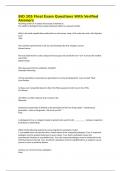
-
BIO 205 Final Exam Questions With Verified Answers
- Exam (elaborations) • 21 pages • 2024
-
- $11.49
- + learn more
BIO 205 Final Exam Questions With Verified Answers Resolving power of an optical microscope is defined as: The ability to distinguish two closely positioned objects as separate entities What is the total magnification produced by a microscope, using a 10x ocular lens and a 10x objective lens? 100x This scientist experimented on his son and developed the first smallpox vaccine: Edward Jenner This man built the first crude compound microscope and coined the term "cell" to mean...
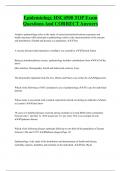
-
Epidemiology HSC4500 TOP Exam Questions And CORRECT Answers
- Exam (elaborations) • 15 pages • 2024
-
- $8.49
- + learn more
Analytic epidemiology refers to the study of causal associations between exposures and health outcomes while descriptive epidemiology refers to the characterization of the amount and distribution of health and disease in a population. True A vaccine that provided immunity to smallpox was created by Edward Jenner Being an interdisciplinary science, epidemiology includes contributions from All of the above (Bio statistics, Demography, Social and behavioral sciences, Law) The historicall...
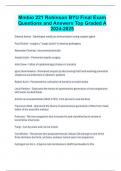
-
Mmbio 221 Robinson BYU Final Exam Questions and Answers Top Graded A 2024-2025
- Exam (elaborations) • 21 pages • 2024
- Available in package deal
-
- $13.99
- + learn more
Edward Jenner - Developed small pox immunization using cowpox agent Paul Ehrlich - sought a " magic bullet" to destroy pathogens Alexander Fleming - discovered penicillin Joseph Lister - Pioneered aseptic surgery John Snow - father of epidemiology (cholera in London) Ignaz Semmelweis - Pioneered asepsis by discovering that hand washing prevented streptococcal infections in obstetric patients Robert Koch - Pioneered the cultivation of bacteria on solid media Louis Pasteur -...
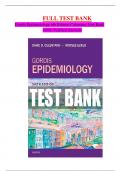
-
Gordis Epidemiology 6th Edition Celentano Test Bank 100% Verified Answers
- Exam (elaborations) • 83 pages • 2023
-
- $13.49
- + learn more
Gordis Epidemiology 6th Edition Celentano Test Bank 100% Verified Answers FULL TEST BANK Gordis Epidemiology 6th Edition Celentano Test Bank 100% Verified Answers Gordis Epidemiology 6th Edition Celentano Test Bank Chapter 01: Introduction Celentano: Gordis Epidemiology, 6th Edition Test Bank MULTIPLE CHOICE 1. Which of the following is an example of tertiary prevention? a. Vaccination for rotavirus for children younger than the age of 1 year b. Surgical amputation of an extremity ...
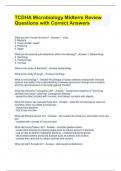
-
TCDHA Microbiology Midterm Review Questions with Correct Answers
- Exam (elaborations) • 18 pages • 2024
- Available in package deal
-
- $13.49
- + learn more
TCDHA Microbiology Midterm Review Questions with Correct Answers What are the 4 small life forms? - Answer-1. Virus 2. Bacteria 3. Fungi (molds, yeast) 4. Protozoa 5. Algae What are the several sub-disciplines within microbiology? - Answer-1. Bacteriology 2. Mycology 3. Protozoology 4. Virology What is the study of Bacteria? - Answer-bacteriology What is the study of fungi? - Answer-mycology What is immunology? - Answer-Knowledge of body's defense mechanism (immune system) ...

-
BIO 205 Exam 1 Study Guide |Latest Update Graded A+
- Exam (elaborations) • 9 pages • 2024
-
- $10.99
- + learn more
BIO 205 Exam 1 Study Guide Robert Hooke first to observe "small chambers" in cork and coined the term cells. Anton van Leeuwenhoek A garment maker who created his own microscopes. Detailed descriptions of microorganisms and described bacteria for the first time. Francisco Redi Used unsealed/sealed meat experiment with maggots to begin showing spontaneous generation wasn't true. Louis Pasteur Swan neck flask, used heat to prevent microbes. Ended spontaneous generation debat...
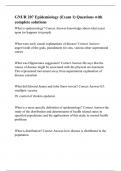
-
GNUR 207 Epidemiology (Exam 1) Questions with complete solutions
- Exam (elaborations) • 5 pages • 2024
-
- $16.49
- + learn more
What is epidemiology? Correct Answer-knowledge about what is put upon (or happens to) people What were early casual explanations of disease? Correct Answer-anger/wrath of the gods, punishment for sins, various other supernatural causes What was Hippocrates suggestion? Correct Answer-He says that the causes of disease might be associated with the physical environment. This represented movement away from supernatural explanation of disease causation What did Edward Jenner and John Snow in...
![Immunology Chapter 1-4 Exam Latest I]Update Graded A+](/docpics/5738440/6681529cd27fd_5738440_121_171.jpeg)
-
Immunology Chapter 1-4 Exam Latest I]Update Graded A+
- Exam (elaborations) • 9 pages • 2024
-
- $11.09
- + learn more
Immunology Chapter 1-4 Exam Latest Immunology - the study of physiological mechanism humans and other animals use to defend their bodies from invasion by other organisms Immune - originally used to describe those who had surived a disease and did not suffer from it when faced with it again Infectious disease - disease cause by a microorganism Immune system - the collection of cells and physiological mechanisms the human body utilizes to fight infections Vaccination; imm...
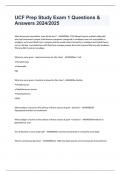
-
UCF Prep Study Exam 1 Questions & Answers 2024/2025
- Exam (elaborations) • 8 pages • 2024
- Available in package deal
-
- $8.49
- + learn more
UCF Prep Study Exam 1 Questions & Answers 2024/2025 Who discovered vaccination, how did he do it? - ANSWERSIn 1796 Edward Jenner realized milkmaids who had contracted cowpox (mild disease symptoms compared to smallpox) were not susceptible to smallpox, so he used fluid from a cowpox pustule would induce immunity to smallpox and tested theory on 8 yr old boy- inoculated boy with fluid from cowpox pustule then later injected the boy with smallpox. The boy didn't contract smallpox. What ar...
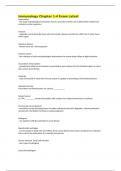
-
Immunology Chapter 1-4 Exam Latest
- Exam (elaborations) • 9 pages • 2024
-
- $10.99
- + learn more
Immunology Chapter 1-4 Exam Latest Immunology - the study of physiological mechanism humans and other animals use to defend their bodies from invasion by other organisms Immune - originally used to describe those who had surived a disease and did not suffer from it when faced with it again Infectious disease - disease cause by a microorganism Immune system - the collection of cells and physiological mechanisms the human body utilizes to fight infections Vaccination; immu...

That summary you just bought made someone very happy. Also get paid weekly? Sell your study resources on Stuvia! Discover all about earning on Stuvia


